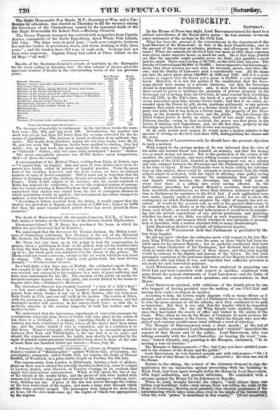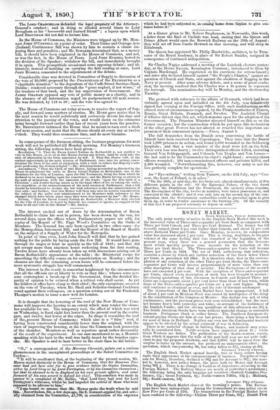POSTSCRIPT.
SATITRD4V.
In the House of Peers last night, Lord BROUGHAM turned his hand to a critical surveillance of the Royal privy purse : he was anxious to see an Exact statement of the savings -m-the Civil List.
What has been the amount of the retrenchment in the department of the Lord-Steward of the Household; -in that of the Lord Chamberlain-; and in the amount of the savings on salaries, pensions, and allowances to the ser- ,vants ? When the estimate for the Civil List was made in 1837, these expenses were given under separate heads, so much for each. He at that time pointed out that the amounts might possibly prove too little, very possibly a great deal too much. There was a saving of 38,7191. on the Civil List, last year. The Dutehy of Cornwall paid 60,0001 or 7o,00a ; butso expensive was themanage- ment, that about seventy per cent went for stewards, agents, and other offi- cers; and the Dutchy of Lancaster -(1 a considerable sum. All the items put mto the privy purse about 140010/. in 1848 and 1849: still it is a great mistake to suppose that the Royal privy purse is 60,0001. a year unencum- bered. However, it is not the genius of the constitution that the Sove- reign should have means of a private character, but that the Sovereign should be dependent on Parliament : and, to show how little countenance there would be given to facilitate the amassing of private property by the Sovereign out of savings from the Civil List, he must remind their Lordships, that till 1799, in Mr. P'itt's time, the lands of a private individual, if the crown descended upon him, became Crown lands ; and that if an estate de- scended upon the Crown by gift, devise, inarriage settlement, or any private manner, that estate was not held as a devisee would hold it, as private pro- perty was held, -but it was held as a Crown land, the property of the Sove- reign, as the property of the Crown and the public. The late George the Thud wished power to devise an estate, itself of but small value, to the Princess Amelia : owing to that accident, the slower was first given to the Crown of making such dispositions, and, for the first time, property in the Sovereign separate from that of the Crown was recognized.
At an early period next session he would make a motion relative to the amount of savings in the Civil List since 1838, distinguishing the classes anti the years.
The Marquis of LANSDOWER said, he should-have the greatest objection to such a motion.
With respect to the savings spoken of, he was informed that the view of his noble and learned friend was founded on mistake, and that the money was so much money not issued. But to the production of the return of the smallest, the most minute, and most trifling account connected with the ar- rangement of the Civil List, founded as that arrangement was on a solemn and wise compact between the Sovereign and the Parliament, he should feel it his duty to object. If once Parliament were to begin calling for - informa- tion on this subject, there would be attempts to demonstrate that the whole subject might be reviewed, with the object of effecting some paltry saving in the expense absolutely necessary for maintaining that royal rank and dignity which becomes the Sovereign, but which will cease if every year there is a sifting into every saving effected. In the half-century preceding her present Majesty's accession, there had been, from inevitable circumstances, no fewer than thirteen instances of applica- tion to Parliament for assistance to the Civil List : if such application were now made, inquiry ought to -precede any grant ; but no aid is asked, the contingency on which Parliament acquires the right of inquiry has not oc- curred. It would be the greatest evil' as well as the greatest Indecorum, to be examining in this House or in the other House of Parliament, or otrt of doors, such details ; as much evil and indecorum as it would be to be examin- ing into the private expenditure of any private gentleman and inquiring whether too much or too little was given in each department. He would 'put it to his noble' and learned friend whether it was advisable to proceed, now or hereafter, -with a motion attended with- so many disadvantages. Lord BROUGHAM desired to exclude all indecorous inquiry. The Duke of WALLINGTON -held that Parliament is precluded -by the law from inquiry. He did not know whether the estimates made with respect to his late Ma- jesty Xing William the Fourth were the same as those which had been de- cided upon for her present Majesty ; but he perfectly recollected that Lord Spencer, when Chancellor of the Exchequer, had declared that no inquiry could be made into the expenditure of those classes, and that such in -dry would be contrary to the dignity and honour of the Crown. He had been personally cognizant of the generous disposition of her-Majesty- to the widows- of soldiers who had fallen in war, and regretted that sufficient 'provision is not made for such benevolent purposes. Lord MONTRAGLE, as one who had been employed in preparing one Civil List and been consulted with respect to another, confirmed -with some detail the general statements of Lord Lansdowne and the Duke of' Wellington, and deprecated -.such questions and conversations in that House.
Lord Ihtouonass rejoined, with criticisms of the details -given by one who bragged of having presided over the making of one Civil -List and having been under-workman in another.
According to him, the Crown might dispense with as many Officers as it pleased, and save their salaries ; and yet Parliament have no alternative but to vote the gross amount of all the salaries, as if they continued to-be paid as heretofore. But then it was said that the inquiry which he suggested would be indelicate. Oh! his old Whig friends were mightily changed since they had tasted the sweets of office and basked in the smiles Of the Court. Why, when he was in the House of Commons he made motions for inquiry into the revenues of the Crown, for which his friends who now-dis- played such extreme sensitiveness voted without a -word of objection.
The Ma9uis of BananaLBAISE made a short speech ; at the end 6f which he said he considered Lord Brougham had "entitled" himself to the censure of that House and of the public. Lord BROUGHAM, who was talking earnestly with the Lord Chancellor, on hearing the word "cen- sure," turned abruptly, ankpointing.to the Marquis, exclaimed, "-Is -he moving a vote of censure ? "
The Marquis of BunsoAsusises—" No; but I say you have -entitled your- self to the censure of the House and the public."
Lord BROUGHAM., in very -hurried accents and with vehemence—" Oh ! have no fear of this House or the public." (Laughter.) He then ran out of the House.
Earlier in the sitting, the refusal of the Attorney-General to sign the application for -an injunction against proceeding with the building in Hyde Park, had been again brought before the House by Lord BROUGHAM, with legal authorities, and general criticisms. He concluded with -a sarcasm against the House for its deference to Royalty.
When he lately brought forward the subject, "dead silence there was
youiLordthips' walls—dead silence there was within the walk of the House of Commons' showing most painfully that absolute prostration of the ...understanding which takes takes place even in the minds of the bravest men when Ihe_word 'prince' is mentioned in this country." (Great sensation,) The Loan Cstaxceztost defended the legal propriety of the Attorney. General's conduct ; and in doing so alluded several tithes to Lord Brougham as his "honourable and learned Mend'"; a lapsus upon which Lord BROUGHAM did not.fail to lecture him.
in the-House of Commons, the Ministers were tripped up by Mr. Mon- Gall JOHN O'CONNELL on a point of order. Their Crime and Outrage Acts (Ireland) Continuance Bill was shown by him to oontain a clause im- posing fines and penalties ; and Mr. Seassan determined that, as a money bill, it should have been originated in the House of COMMOMI, and not, as was the fact, in the House of Peers. Lord Joint Rrasinx bowed to the decision of the Speaker; withdrew the bill, and immediately brought it in again. This promptitude occasioned some opposing debate ; and ul- timately, instead of insisting on carrying the first reading at once, Lord JOHN RUSSELL consented to the adjournment of the debate.
Considerable time was devoted in Committee of Supply to discussion of the vote of 30,000/. proposed by the CHANCELLOR of the Emerson= as a "charitable donation' to the depositors of the Cuffe Street Savings-Bank, Dublin ; rendered necessary through the "gross neglect, if not worse," of the trustees of that bank, and the lax supervision of Government. Sir Jamas GRAHAM opposed any vote of public money as a charity, and in the absence of all information urged its postponement till next session. He was defeated, by 118 to 39 ; and the vote was agreed to.
The House of Commons sat today at noon, to receive the report of Sup- ply, and forward some matters of routine. Mr. HUME gave notice that in the next session he would sedulously and exclusively devote his time and attention to the passing of the votes, and would insist on the estimates being brought forward earlier than has of recent years been the practice. Mr. Bitornzarow informed the House that ho meant to turn over a fresh leaf next session, and insist that the House should sit every day at twelve o'clock. They would thus economize time, and do more business.



























 Previous page
Previous page